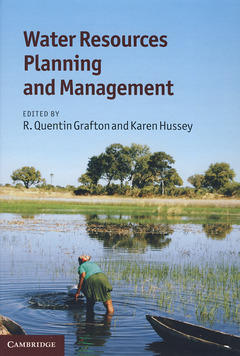Water Resources Planning and Management
Langue : Anglais
Coordonnateurs : Grafton R. Quentin, Hussey Karen

The most comprehensive handbook ever published on water resource issues from a global perspective, for students, researchers and professionals.
Water is an increasingly critical issue at the forefront of global policy change, management and planning. There are growing concerns about water as a renewable resource, its availability for a wide range of users, aquatic ecosystem health, and global issues relating to climate change, water security, water trading and water ethics. This handbook provides the most comprehensive reference ever published on water resource issues. It brings together multiple disciplines to understand and help resolve problems of water quality and scarcity from a global perspective. Its case studies and 'foundation' chapters will be greatly valued by students, researchers and professionals involved in water resources, hydrology, governance and public policy, law, economics, geography and environmental studies.
List of contributors; Foreword; Preface; Acknowledgements; Introduction; Part I. Understanding 'Water': 1. Climate change and the global water cycle; 2. Understanding global hydrology; 3. Groundwater and surface water connectivity; 4. Understanding the basics of water quality; 5. Inland water ecosystems; 6. Water, biodiversity and ecosystems: reducing our impact; 7. Global food production in a water constrained world: exploring 'green' and 'blue' challenges and solutions; Part II. Water Resources Planning and Management: 8. Water law and the search for sustainability: a comparative analysis; 9. Tackling the global water crisis: unlocking international law as fundamental to the peaceful management of the world's shared transboundary waters - introducing 'the H2O paradigm'; 10. Risk and uncertainty in water resources planning and management: a basic introduction; 11. Collaboration and stakeholder engagement; 12. Capacity building and knowledge sharing; 13. Adaptive and integrated management of water resources; 14. Gender and integrated water resource management; 15. Environmental flows: achieving ecological outcomes in variable environments; Part III. Water Resources Planning and Management - Case Studies: Section 1. Water and Waste Water Treatment: 16. Overcoming water scarcity in Perth, Western Australia; 17. Cities, agriculture and environment - sharing water in and around Hyderabad, South India; 18. Pricing of urban water services: the case of France; 19. Collaborative flood and drought risk management in the Upper Iskar Basin, Bulgaria; Section 2. Agricultural Water Use: 20. The role of research and development in drought adaptation on the Colorado River Basin; 21. Climate change in the Murray-Darling Basin: implications for water use and environmental consequences; Section 3. Urban Water Supply and Management: 22. The urban water challenge in Australian cities; 23. Water sensitive urban design; 24. Water security for Adelaide, South Australia; Section 4. Aquatic Ecosystems: 25. Groundwater contamination in Bangladesh; Section 5. Industrial and Mining Water Use: 26. Water issues in Canada's tar sands; 27. Science, governance, and environmental impacts of mines in developing countries: lessons from Ok Tedi in Papua New Guinea; Section 6. Rural and Remote Communities: 28. Aboriginal access to water in Australia: opportunities and constraints; 29. Providing for social equity in water markets: the case for an indigenous reserve in northern Australia; Section 7. Water Infrastructure Design and Operation: 30. Flood hazard, floodplain policy and flood management; Section 8. Managing Water Across Borders: 31. Decision making in the Murray-Darling Basin; 32. Challenges to water cooperation in the lower Jordan River Basin; 33. Adaptation and change in Yellow River management; 34. Managing international river basins: successes and failures of the Mekong River Commission; Section 9. Market Mechanisms in Water Management: 35. Inter-sectoral water trading as a climate change adaptation strategy; Contributors' biographies; Index.
R. Quentin Grafton is Professor of Economics at Crawford School of Economics and Government at The Australian National University. He is Chairholder of the UNESCO Chair in Water Economics and Transboundary Governance, Director of the Centre for Water Economics, Environment and Policy (CWEEP), and Co-Chair of the ANU Water Initiative – a transdisciplinary research and education initiative in water resource management. Professor Grafton has over 20 years experience in the fields of agriculture, the environment, natural resources and economics. He is the author or editor of 10 books, more than 80 articles in some of the world's leading journals, and numerous chapters in books.
Karen Hussey is a Research Fellow at the Crawford School of Economics and Government at The Australian National University, and the ANU Vice Chancellor's Representative in Europe (Brussels). She has published widely in environmental politics and economics, water policy and management and global environment governance. Dr Hussey is Chair of the COST-funded international research initiative 'Accounting for, and managing, the links between energy and water for a sustainable future' and is Co-Chair of the ANU Water Initiative.
Karen Hussey is a Research Fellow at the Crawford School of Economics and Government at The Australian National University, and the ANU Vice Chancellor's Representative in Europe (Brussels). She has published widely in environmental politics and economics, water policy and management and global environment governance. Dr Hussey is Chair of the COST-funded international research initiative 'Accounting for, and managing, the links between energy and water for a sustainable future' and is Co-Chair of the ANU Water Initiative.
Date de parution : 02-2011
Ouvrage de 800 p.
18x25.4 cm
Disponible chez l'éditeur (délai d'approvisionnement : 14 jours).
Prix indicatif 112,80 €
Ajouter au panierThème de Water Resources Planning and Management :
© 2024 LAVOISIER S.A.S.



